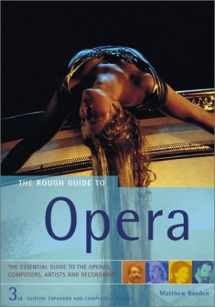
The Rough Guide to Opera (3rd Edition)
Book details
Summary
Description
INTRODUCTION
The combination of music and drama is a thrillingly potent mix, but opera remains off-putting for too many people. Partly this is due to the social exclusivity cultivated by many opera houses, especially in the English-speaking world, but the sheer diversity of the music is also a factor. Thousands of operas have been written since Monteverdi and his colleagues pioneered the genre some four hundred years ago, and though many of these are no longer performed the repertoire can still seem daunting. Opera-house schedules place late-Renaissance pageants alongside Italian melodramas or modern psychodramas, and the situation is even more perplexing when you look at the CD catalogue, where you’ll find more than two hundred complete recordings of Verdi’s operas, for example, and around thirty of La traviata alone. Whether you’re new to opera or are already familiar with many of its masterpieces, THE ROUGH GUIDE TO OPERA is the essential guide through this mass of music, providing concise biographies of all the significant composers, incisive discussions of their major works, and detailed surveys of the recordings.
The entire history of opera is covered here, from its beginnings in late-Renaissance Italy to the latest exciting work from contemporary names such as John Adams and Judith Weir. Mozart, Wagner, Verdi, Puccini, Strauss and all the other greats are discussed in depth, as are lesser-known figures from Auber to Zimmerman. Of course, a completely comprehensive guide to opera, even one that restricted itself to opera on CD, would be impossibly unwieldy, so we’ve excluded some figures we regard as being peripheral, and we’ve been selective with the output of many composers, concentrating on what we think are the key operas. Gaetano Donizetti, for example, wrote more than seventy operas, but we’ve concentrated on the ones you’re likeliest to encounter either on disc or on stage. Similarly, we pick up Strauss’s career with Salome, because it’s this opera, his third, that marks the beginning of the work that makes him one of the most successful opera composers of the first half of the twentieth century. To this tally of the top rank we’ve added some composers who have been unfairly neglected, such as Zemlinsky, Busoni and Montemezzi, some operas that should be better known, such as Cavalli’s La Calisto, plus a few masterpieces from the world of operetta, the half-sister of opera.
When it comes to CDs the situation requires far greater selectivity, for the CD era has brought with it a welter of new opera releases – though the bulk of these are reissues of old recordings, with so-called "historic" items (which generally means pre-stereo) now being something of a boom area. There are two reasons for this glut of reprocessed music. In the first place, with classical music rarely shifting units except when an event like the "Three Tenors" circus catches the attention of the TV cameras, few record companies can regularly afford to make a new studio recording of an opera. Most new opera sets are taped at a live performance and then digitally tidied up – a far cheaper process than getting soloists, orchestra and conductor into the studios for a long haul. The economics of opera are also relevant to the second point, which is that the older recordings are often better. More than ever before, opera is a celebrity business, and whenever a label does invest in a! studio session, it’s obliged to reduce the risk by building the set round stars who might be appearing in London one night, Paris the next, then turning up in a New York studio for a few days to record something with people they have never met before. Sometimes this system produces exciting results, but often it doesn’t, and it’s increasingly rare to find new recordings that have the sense of cohesion that was commonplace when record labels used to sign up an entire company to make recordings with a core cast and a single conductor.
And there’s one other factor to take into account – the dearth of great singers for some types of opera. In the 1950s there were plenty of tenors capable of producing a memorable Otello; since the 1970s one singer has had a virtual monopoly of the role – Plácido Domingo. The same problem affects Wagner singing: listen to a Ring cycle recorded back in the 1960s and you’ll hear amazingly strong and passionate performances right through the cast; pick up a recent set, and you’ll find weaknesses even in the major parts. However, the situation isn’t as grim as some fogeyish critics like to make out. There are some fabulous young singers on the circuit, such as Angela Gheorghiu, Cecilia Bartoli, Juan Diego Floréz and Bryn Terfel, while conductors such as John Eliot Gardiner and Daniel Barenboim have shown time and again that every generation can find something fresh in the music that has lasted. On top of that, an upsurge of interest in early opera has been fuelled by ear-opening interpretations from a rising number of specialist groups and labels, and there are more top-flight Mozart singers at work today than at any time since the 1950s. Challenging new work is being written, and several opera producers are capable of putting on a show that’s as exciting as anything in modern theatre. With a wealth of material old and new to explore, there has never been a better time to get into opera, and The Rough Guide to Opera is the book to take with you on your exploration.


We would LOVE it if you could help us and other readers by reviewing the book
Book review



